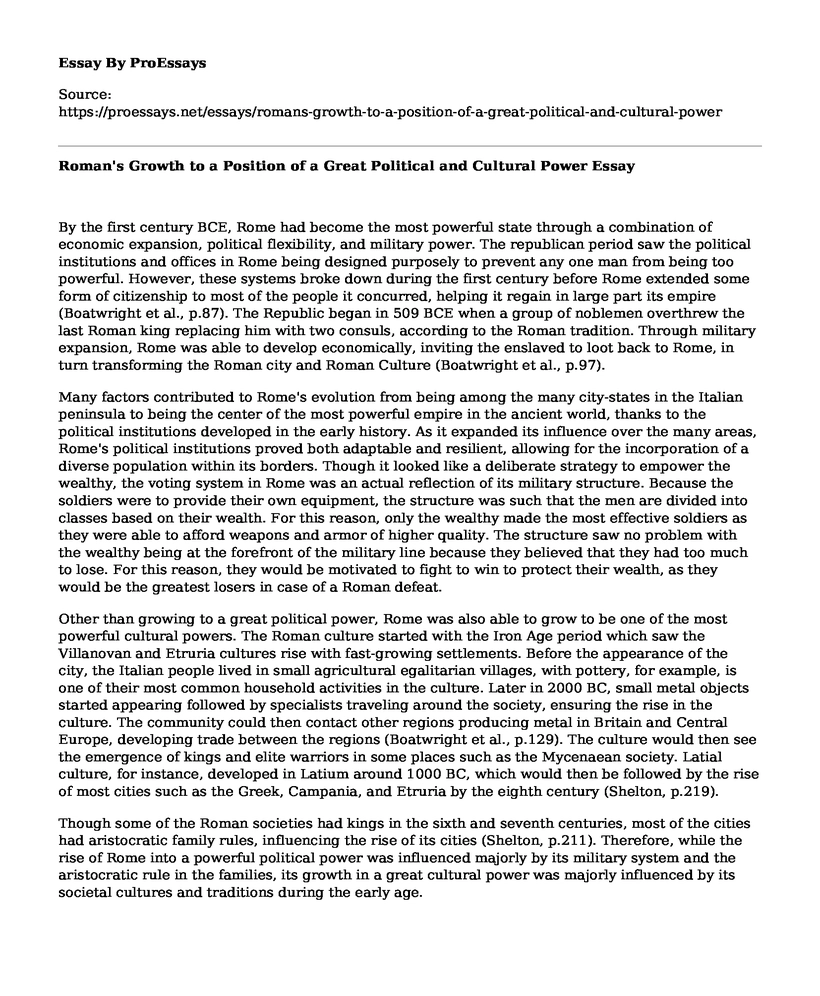By the first century BCE, Rome had become the most powerful state through a combination of economic expansion, political flexibility, and military power. The republican period saw the political institutions and offices in Rome being designed purposely to prevent any one man from being too powerful. However, these systems broke down during the first century before Rome extended some form of citizenship to most of the people it concurred, helping it regain in large part its empire (Boatwright et al., p.87). The Republic began in 509 BCE when a group of noblemen overthrew the last Roman king replacing him with two consuls, according to the Roman tradition. Through military expansion, Rome was able to develop economically, inviting the enslaved to loot back to Rome, in turn transforming the Roman city and Roman Culture (Boatwright et al., p.97).
Many factors contributed to Rome's evolution from being among the many city-states in the Italian peninsula to being the center of the most powerful empire in the ancient world, thanks to the political institutions developed in the early history. As it expanded its influence over the many areas, Rome's political institutions proved both adaptable and resilient, allowing for the incorporation of a diverse population within its borders. Though it looked like a deliberate strategy to empower the wealthy, the voting system in Rome was an actual reflection of its military structure. Because the soldiers were to provide their own equipment, the structure was such that the men are divided into classes based on their wealth. For this reason, only the wealthy made the most effective soldiers as they were able to afford weapons and armor of higher quality. The structure saw no problem with the wealthy being at the forefront of the military line because they believed that they had too much to lose. For this reason, they would be motivated to fight to win to protect their wealth, as they would be the greatest losers in case of a Roman defeat.
Other than growing to a great political power, Rome was also able to grow to be one of the most powerful cultural powers. The Roman culture started with the Iron Age period which saw the Villanovan and Etruria cultures rise with fast-growing settlements. Before the appearance of the city, the Italian people lived in small agricultural egalitarian villages, with pottery, for example, is one of their most common household activities in the culture. Later in 2000 BC, small metal objects started appearing followed by specialists traveling around the society, ensuring the rise in the culture. The community could then contact other regions producing metal in Britain and Central Europe, developing trade between the regions (Boatwright et al., p.129). The culture would then see the emergence of kings and elite warriors in some places such as the Mycenaean society. Latial culture, for instance, developed in Latium around 1000 BC, which would then be followed by the rise of most cities such as the Greek, Campania, and Etruria by the eighth century (Shelton, p.219).
Though some of the Roman societies had kings in the sixth and seventh centuries, most of the cities had aristocratic family rules, influencing the rise of its cities (Shelton, p.211). Therefore, while the rise of Rome into a powerful political power was influenced majorly by its military system and the aristocratic rule in the families, its growth in a great cultural power was majorly influenced by its societal cultures and traditions during the early age.
Works Cited
Boatwright, Mary T, Daniel J. Gargola, and Richard J. A. Talbert. The Romans: From Village to
Empire ; [a History of Ancient Rome from Earliest Times to Constantine]. New York, NY [u.a.: Oxford Univ. Pr, 2004. Print.
Shelton, Jo-Ann. As the Romans Did: A Sourcebook in Roman Social History. Oxford: Oxford University Press, 1998. Print.
Cite this page
Roman's Growth to a Position of a Great Political and Cultural Power. (2022, May 09). Retrieved from https://proessays.net/essays/romans-growth-to-a-position-of-a-great-political-and-cultural-power
If you are the original author of this essay and no longer wish to have it published on the ProEssays website, please click below to request its removal:
- Cause and Effect Essay on Cold War
- Benjamin Franklin and Deborah's Relationship Essay
- Essay Sample on New Colonialism: Impact on African Nations and Their Sovereignty
- Capitalism Versus Communism: The United States Versus the Soviet Union in the Cold War Years
- Harriet Tubman: Symbol of Hope for Underground Railroad - Essay Sample
- Essay Example on 4 Global Threats: Globalization, Climate Change, War, Tech
- Essay on Ronald Reagan's Masterful Communication in the Face of the Challenger Disaster







